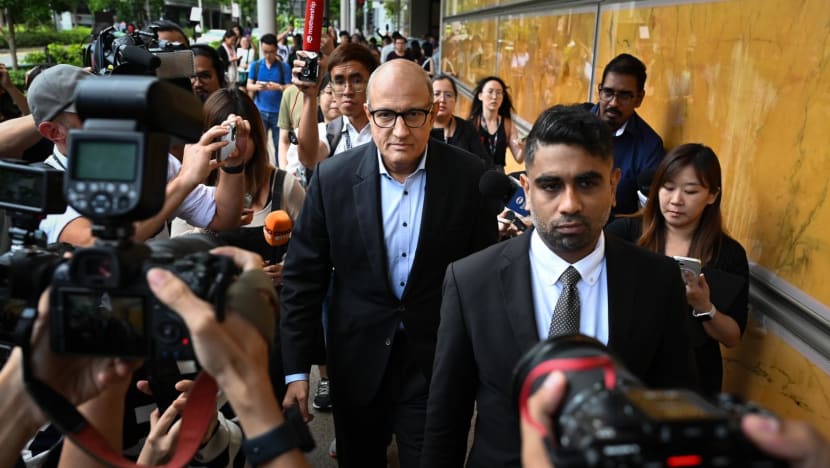Iswaran case: Not uncommon for charges to be amended on the way to courts, says Chan Chun Sing
The Minister-in-charge of the Public Service also says that Section 165 of the Penal Code "is a corruption charge".

Former transport minister S Iswaran leaves the High Court after he was sentenced to a year in jail. (Photo: CNA/Syamil Sapari)

This audio is generated by an AI tool.
SINGAPORE: It is not uncommon for charges to be amended on their way to the courts because of developments in the case, said Minister-in-charge of the Public Service Chan Chun Sing.
He was responding in parliament on Monday (Oct 14) to a question posed by Workers’ Party MP Sylvia Lim on whether the initial corruption case against former transport minister S Iswaran was “weak” which led to a reduction of charges.
The Aljunied MP, who is also a lawyer, asked: “Would the public be justified to conclude that actually, the corruption case against the (former) minister was weak, hence resulting in the reduction of charges away from the PCA (Prevention of Corruption Act)?"
Mr Chan replied that such amendments are "not odd" and "do happen regularly in the courts ... because of developments, representations by the prosecution and the defender”.
Iswaran was in January handed 27 charges, among them two charges of corruption.
In September, on what was to be the first day of his trial, the two corruption charges were amended to lesser charges under Section 165 of the Penal Code - which forbids all public servants from obtaining any valuable thing from someone involved with them in an official capacity - and one charge of obstruction of justice, to which he pleaded guilty to among other charges.
Ms Lim then noted that after Iswaran was sentenced to 12 months in prison on Oct 3, Prime Minister Lawrence Wong had said that Singapore needs stay clean of corruption.
She asked whether this was because Mr Wong thought Iswaran had acted corruptly, regardless of the charges that were made against him.
Mr Chan said that Section 165, which applies to public officers, "is a corruption charge".
Ms Lim then asked for more clarity, saying that when it comes to Section 165, no corrupt element needs to be proved, which is why it is easier to get a conviction under the section.
Mr Chan said: “In Section 165, you do not need to prove a quid pro quo on both sides. You just need to prove that the person has taken. It doesn't mean that it's not a corruption charge.”
NO NEED FOR A REVIEW OF ANTI-CORRUPTION LAWS FOR NOW
Ms Lim also asked about whether Singapore’s anti-corruption laws should be reviewed for greater efficacy.
Mr Chan said that no matter how stringently Singapore acts against corruption, from time to time, some individuals may fall short.
“When this happens, we should not have a knee-jerk reaction and immediately tighten or add more rules,” said Mr Chan.
Instead, it needs to be determined if it is an individual or systemic matter.
“If the rules were clear but were flouted or ignored, what we need to do is not to adjust the rules, but to take decisive action against the offender. If the rules were unclear, we should clarify or simplify the rules. If the rules were too lax, or if it was a new situation not envisaged or covered by the rules, we should update the rules,” he said.
Ms Lim then asked if there was still reason for the Government to look into the PCA, given the rationale the Attorney-General’s Chambers (AGC) provided as to why PCA charges were amended.
The AGC had said it amended the charges after considering the litigation risks involved in proving them beyond a reasonable doubt at trial, “given that there are two primary parties to the transactions, and both would have an interest in denying corruption in the transactions”.
Mr Chan noted that Law and Home Affairs Minister K Shanmugam had raised the need to consider aligning Section 165 with the PCA.
In 2022, Mr Shanmugam said the government would review the possibility of shifting offences listed under Section 161 to 165 of the Penal Code, to under the PCA instead.
“But as of now, suffice to say, the CPIB (Corrupt Practices Investigation Bureau) and our enforcement agencies find the current framing able to allow us to do the job that we need to do,” said Mr Chan.
“But going forward, if there are new developments that necessitate a review of this, we are open to them.”
Ms Lim also asked if the CPIB and AGC did a thorough job in the Iswaran case, given that charges had to be amended subsequently.
There are reasons to believe that CPIB and AGC have done their job properly, said Mr Chan.
“But as I've mentioned and I've explained along the way, it is not uncommon for the prosecution and the defence to see how the situation develops, and sometimes charges may be amended in this situation or in any other cases,” he reiterated.
















